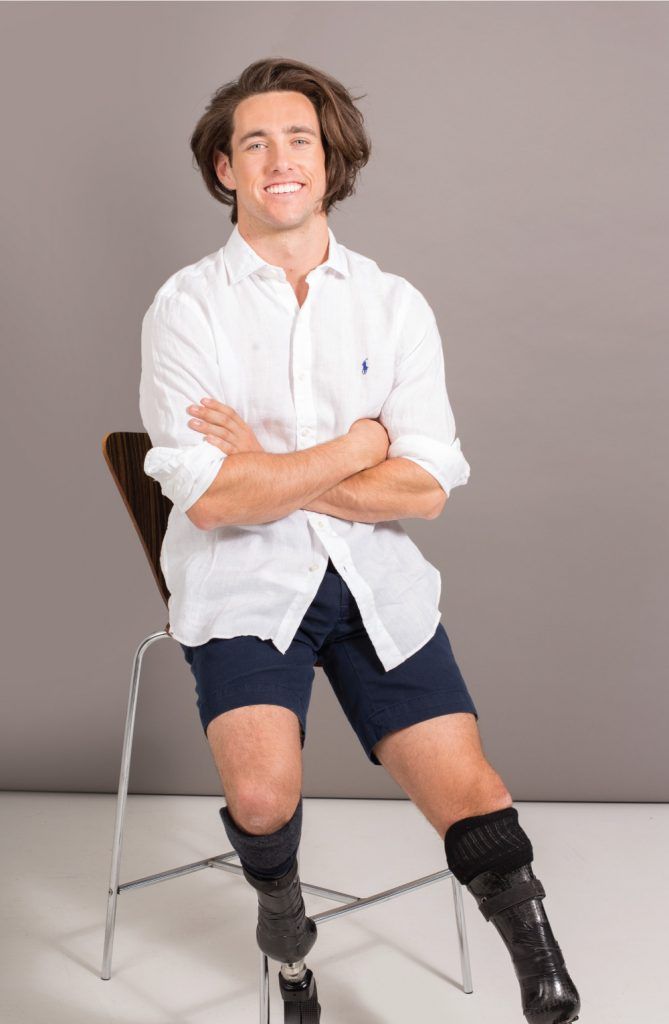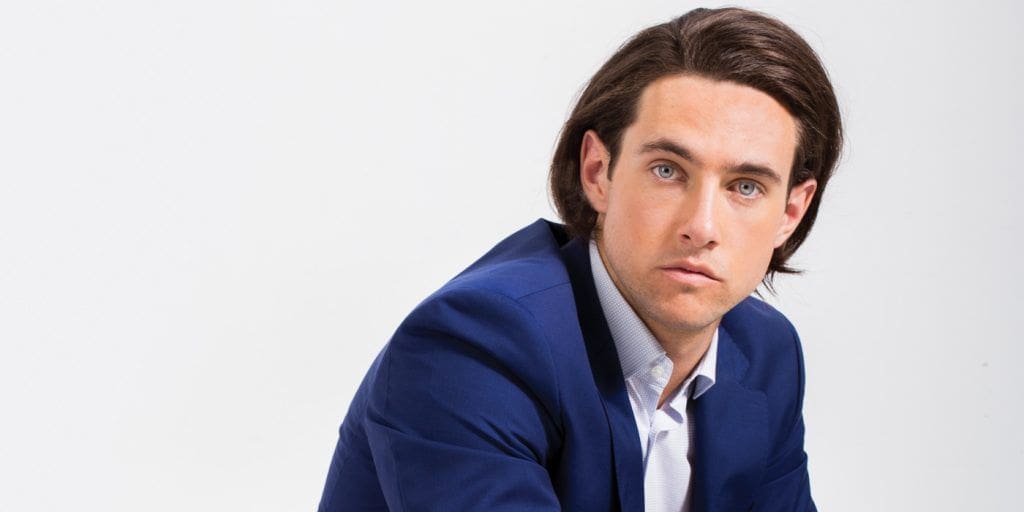Liam Malone – The Fast Track To Success
The M2 Champagne Bollinger Man of the Year 2016 went to two time gold and one time silver medal winning Paralympian and blade running record breaker Liam Malone. He may have only had three years to prepare for Rio but as he has proven, he moves quickly. On and off the track. And this is only the beginning…
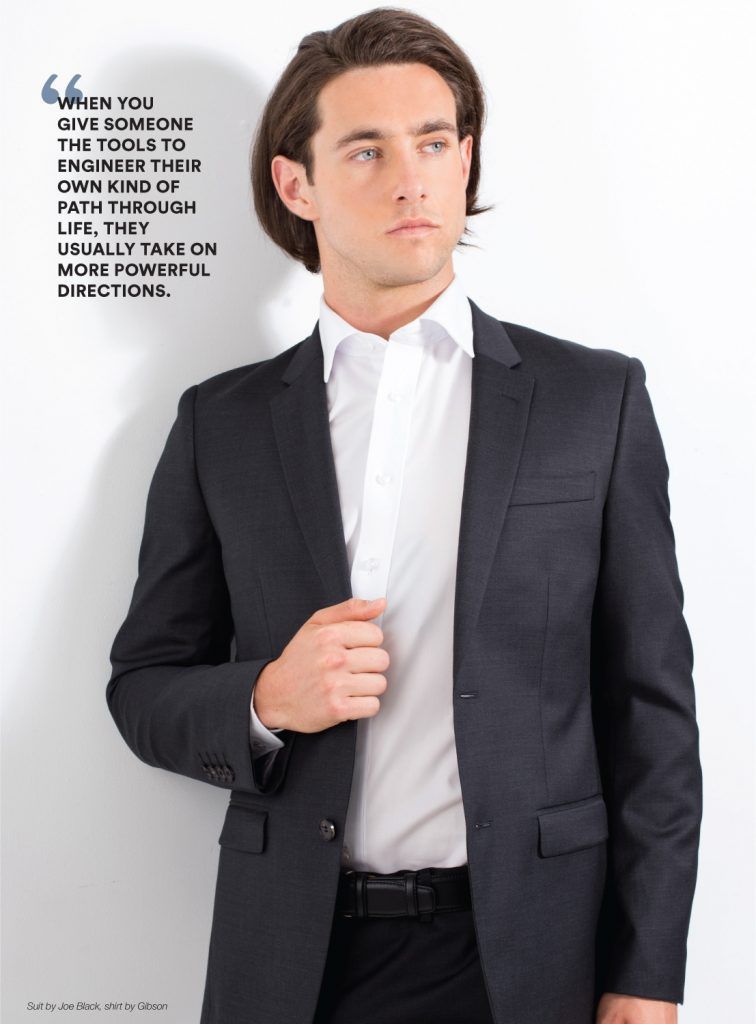
“If you can get through adversity and learn from it, I think that just gives you a lot of confidence to make a real positive change to that adversity that’s affected you. So marginalised groups, when they do something powerful, it’s usually really, really powerful.”
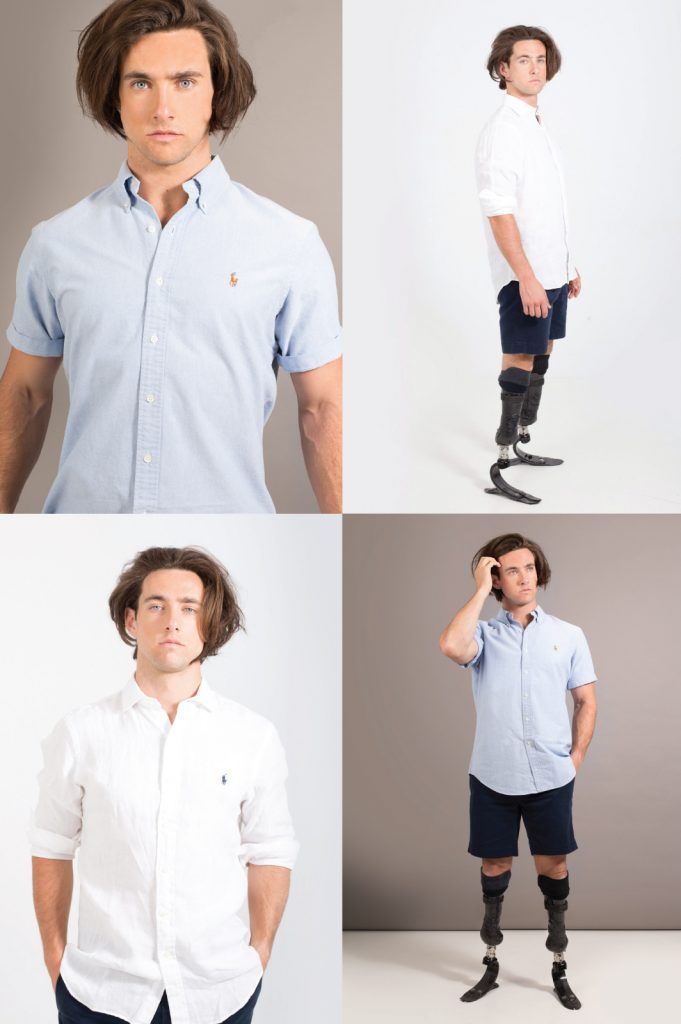
What was it that drove you growing up, what did you find inspiration in?
I think it’s mainly the way that my parents shaped me. They pushed me really hard. For example, at school cross-country, the girls went first and then there was a two-minute break and then the boys went. So I was with the boys and every single one of the boys beat me and then every single one of the girls beat me. And my mum continued to make me do that every year even though it was torture. People would laugh at me and I would be crying. Once, at school athletics, my leg fell off and there were 800 students laughing at me – my mum taped up my leg and made me run the next race. Learning to snowboard, I couldn’t ride the T-bar up the slope so mum made me walk to the top of the hill and ride down. I only got up three times before I learnt how to balance properly on the snowboard in order to be able to use the T-bar. So I think both my mum and my dad were the driving influences in accepting failure as just a setback.
The second thing is that society labels me as disabled and yet I feel I am way more capable than most people at doing things.
Do you feel the public’s perception of disability defined you when you were growing up?
In growing up, yes, but now no, because, for instance, I run faster than most people. Growing up, yes. Absolutely. Especially people that didn’t know me. Growing up when I met people, the rhetoric would be: ‘Oh, can you run?’ Now when I meet someone, it’s like: ‘Oh can you drive? Can you drive a manual?’ It’s like: ‘Yeah, I’m just a normal guy.’
Obviously, in terms of being able to run faster than most humans, there is an element of technical advancement with the blades, but there is the possibility that this will be limited at the Paralympics. Do you know where this is at?
They really want to try and make it an even competition. At the moment, they are saying that everyone is too tall and there are variances in different blades, which means that people could be competing at a disadvantage. And that’s true in one sense, but really, they need to be looking at the bigger picture. It comes back to the question of what they actually want to achieve with the Olympics.
The common answer that would come to my mind is to use the Paralympics to make the able-bodied Olympics look like The Antiques Road Show. You could have a whole lot of cyborgs and people wearing exoskeletons doing a whole lot of crazy activities. So I don’t think that regulating it is a very good idea. It’s inevitable that blade runners will be able to run faster than humans anyway.
That’s not far away at all. Regulation will just limit that.
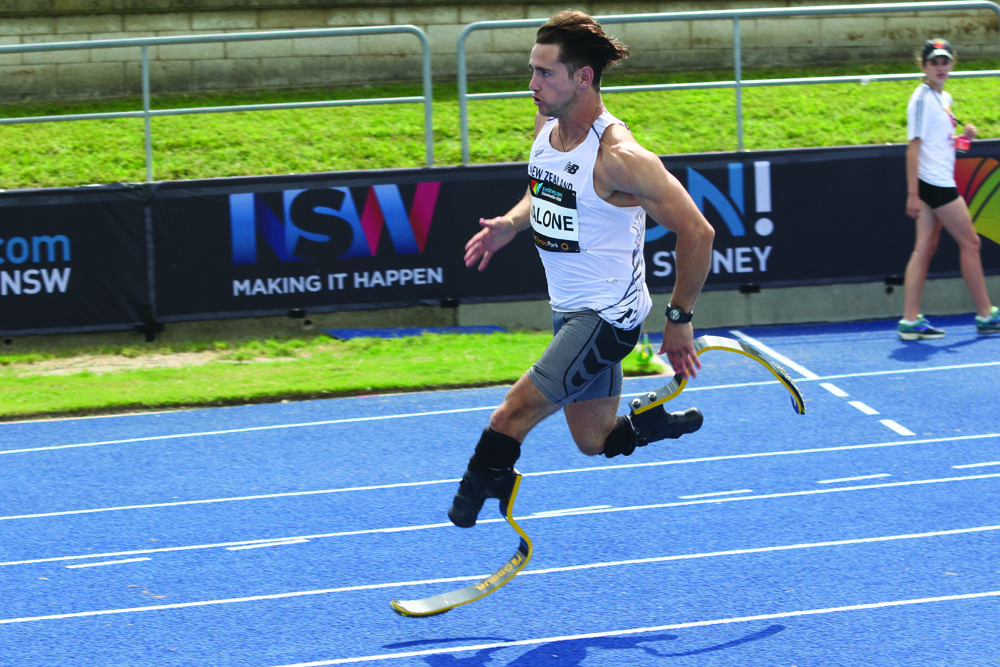
Are the Paralympics a big driver of the development of technology that then goes into everyday use?
Exactly. It all eventually crosses over. Just like things are developed in the military that cross over into the civilian world. In blades, for example, the technology that they use in blades has crossed over and been integrated with everyday walking limbs. So now everyday walking ones are more responsive. And that gives the average amputee a whole new quality of life. Our quality of life – the value that we take in life – is really derived from our relationship with technology. And the big thing is being functional, so you can contribute, play and just be a normal human. So it’s really important that we move to the future as fast as possible.
Do you feel you have much of a voice now, in terms of being able to influence decisions around that?
We’ll soon find out, because there hasn’t yet been a situation in which I can test that. But I’m certainly going to be pushing my argument for having no regulations whatsoever, and that problem’s not too far off, because we have the world champs coming up next year. It will be interesting to see whether or not I do have that voice. I must have some value for discussing the topic, because I’ve won two gold medals so I’m one of their top athletes, so they should listen to what I have to say.
And the spotlight really has been on you since Rio. Beyond the regulations, is there any other way you want to use that spotlight?
Absolutely. So, number one: break down the misconceptions that society has of people with disabilities. That’s really, really important. The second one is that climate change is upon us and my generation is inheriting a sinking ship, which is really horrifying. Also, right now the leader of the free world is a climate change denier, so it’s so important, even if you are someone like myself, who is essentially nobody still, in terms of being an agent of change to speak out and use the spotlight while you have it. I am still a voice in a community which data shows is facing a four-degree change in temperature by the end of the century. I really love this country. I’ve grown up being really passionate about the environment. So to see harm come to our ecosystem, which is unique in the world, is devastating.
How do you think the rest of your generation will go? Millennials seem to have formed a reputation of being more narcissistic and focused on social media than anything else.
Sure… the selfie generation.
Yes, and do you think there is enough motivation and enough anger among them to force change?
I don’t think that will be the way it is solved. I think the way it will be solved is by companies producing environmentally friendly goods that are better alternatives than those currently available… so they are easily accessible… so they are actually a better product in themselves. And in terms of Millennials: we are way more green conscious than Generation X.
It’s a bit of a catch 22 isn’t it? That the demand needs to be there in order for companies to move that way.
The demand is there. It is common sense that we need to move that way.
Ok, so that’s where you want make an impact, what are the stages along the way?
Ok, so objective number one is performance – as always. To become the fastest person ever to run 400 metres. Limbs, no limbs… I do it at the Paralympics in 2020, which is not an unrealistic task. It’s just going to require quite a lot of research, and getting really smart people behind me to do that.
Then I’m going to set up – hopefully at the end of this year, depending on how easy it is to do – a creative agency or talent agent for people with disabilities to work with companies to accelerate breaking down those barriers. Using my business degree, which I’ve just finished.
And then I have World Champs next year. Obviously win that! That’s the objective of racing.
Climb Mount Cook in 2018, to fundraise for cancer. I intend to shave my head while I’m at the top.
Then I’ll have the World Champs the following year, and then Tokyo the year after that. So that’s a bit of a timeline.
I can’t tell you what I have planned for the next few months, let alone a timeline of goals. Is your being able to part of your secret?
I’m a really ambitious guy. I mean, going to the Rio Paralympics in the first place was only through that I had less than three years to get there. That was a gamble in itself. But I’m willing to go all-in on things.
I’ve always been a real dreamer. But throughout my teens, my mum had cancer. And I was going through the process of figuring out who I was. So, I was this teenager and I had no legs, wondering: ‘Where do I fit in society? Where do I fit in in the social groups – high school? What does this all mean?’ I didn’t wear shorts for seven years because I was so self-conscious.
So even at that stage, I always thought of myself as doing important things to add value to society, and make the planet better off. But I never executed on any of it, and I never knew how to as a teenager. And then I was at university, and I was drinking four nights a week and whatever else…
It was when my mum died and I was really depressed, I thought: ‘How do I get myself out of this, and how do I start creating these opportunities to actually live the life that I want to live?’
And so I think I had to do two things. I had to build a skill set that would allow me to achieve something, no matter what it is. And even if I decided to go into the arts or business or science, whatever, I needed to build a solid skill set. That would be the first, most important, thing. Then that would help me change my environment.
By going to the Paralympics, I really achieved both of those. I then put myself in a high-performance environment, where I can reach out to lots of smart people. And that could develop a really, really good skill set. Which is, like, the basic stuff: of being really organised; planning; being audited by people around you; and so. And that pretty much played out exactly as planned.
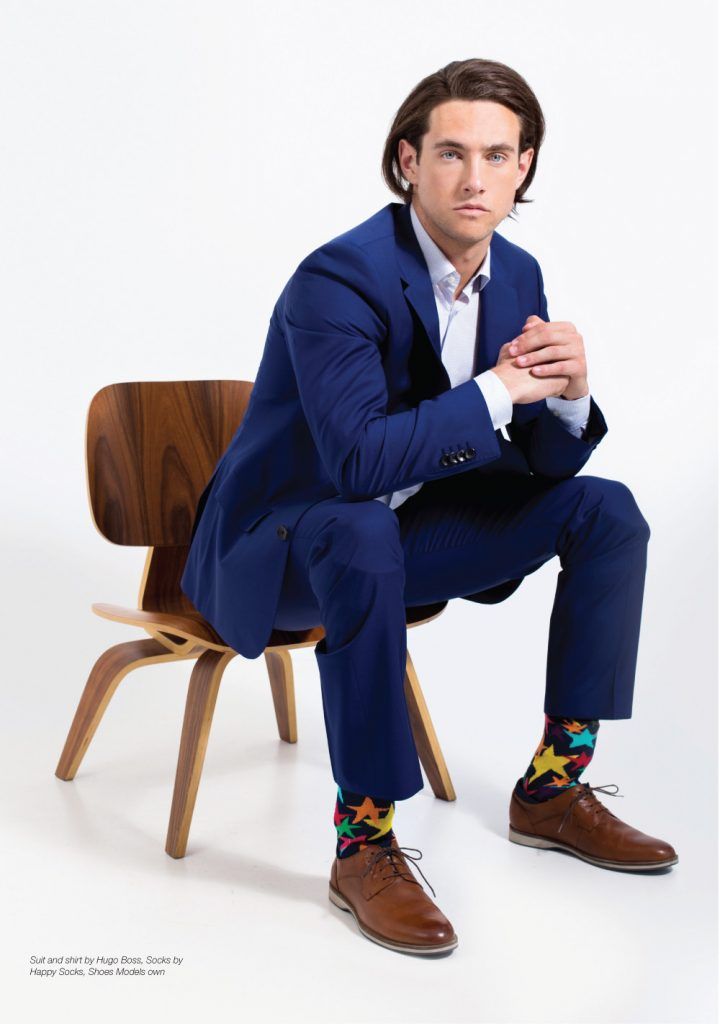
You make it seem kind of easy, but for a lot of people struggling with grief and demons, it’s hard to construct a way out. What gave you the presence of mind to be able to do that?
I did it by brainstorming a whole bunch of different scenarios. Go into stand-up comedy. Go into acting. Start my own business. Sport… Then creating an analysis of where each one of those pathways would go. If I could add more value and what I could derive from it.
I looked at sport and thought: ‘What would be the steps? Who would I need to reach out to? Is it possible in that amount of time?’ And I went through that process, and I figured it would probably be worth doing. I walked into Paralympics the next day, said, like: ‘What do I need to do to go to Rio?’ And they said: ‘These are the times you need, to win your event.’
Then I had to fundraise, get players. And then train twice a day, six days a week for three years. And continually try to improve myself by reaching out to certain people, getting certain opinions. Like reaching out to Oscar Pistorius, for example. Everyone. You have to take in everyone’s opinions on things, and figure out the way other people have done things.
The analogy I always use is: ‘Before you go and climb any mountain, talk to the guy that’s climbed it.’ Then you avoid the mountain lions and the big gaps and the rocks falling on your head and stuff.
What’s your take on nature versus nurture?
I think nurture’s so much more important. Because when you’re around people that are really driven and really positive, your whole mindset changes immediately. You start believing in yourself more.
Do you feel the adversity you have faced along the way has created this psychological power you seem to have?
Well, yes. Here’s the thing with adversity: I think adversity is really, really important in achieving something of greatness, or doing something great for the world. So, say you’re … say I was me, but I had real legs. I’d be born into a middle socio-economic class. I’m white and white people have never experienced racism in the history of the world. I’ve got a good life span. My life is going to be pretty much perfect, just cruising on through. Why would you want to change anything?
So, unless you face some sort of adversity [and] create some sort of really strong challenges for yourself, you never really want to create any sort of change to the environment. So I think adversity’s really good in shaping people. But if you can get through adversity and learn from it, I think that just gives you a lot of confidence to make a real positive change to that adversity that’s affected you. So marginalised groups, when they do something powerful, it’s usually really, really powerful.
It’s interesting that you say marginalised groups. We’ve got disability in our families, we’ve got disability among our friends. So we’re talking about a big chunk of the population, but for reasons probably not actually related to any physical limitation, they aren’t being given employment opportunities, which means there’s a whole group of people that aren’t being given the opportunity to show us what they can do.
Yeah. Well when you grow up with a disability, you very much feel like there are barriers, and this is the example I use. I got a really bad report when I was about eight. And my mum was asking: ‘Why have you done bad in maths and in science and stuff?’ And my response was – and I total believed it, I was like: ‘Because I’m disabled.’ And she was really taken aback by it. And tried hard to reshape my thinking. Because when you grow up, you feel like all these barriers are put in place. And you’re labelled as being broken or disabled. That label is being broken.
Yeah, I have to say that I am struggling to say the word ‘disabled’ when I talk to you because there’s not anything disabled about you. Do you think that term is maybe part of it as well?
Yeah, get rid of that and use ‘adaptive’. Adapt, that’s what humans do. We use technology to adapt. So [that’s] what people with disabilities are going to do. It won’t be that long before people in wheelchairs will have exoskeletons, and they’ll be walking again.
Going back to when you blame your maths report on this concept – that you are broken – did that come from that kind of societal perception?
Definitely. Yeah, just because of all the small events that you go through in life. All these things accumulated to give and shape my mindset – or shape people with disabilities’ mindsets. Or if they’re black, or whatever minority. So, all that stuff is really powerful. And I certainly resonate with other groups that are marginalised in society, or in the face of adversity.
What advice would you have for parents, say, to raise another you. To create an environment where what could be a disability for a child becomes a platform for success?
Without cloning me? Obviously, really encourage your kid to try things and fail. And then when they fail, make light of it. Reach out to other parents who have kids with disabilities. Get them involved in Paralympic sport. Ensure they have the best technology available to them at that time, to ensure they’re leading the most advantageous life, and achieving what they are capable of doing themselves. Actually, probably, the most important thing is when you give someone the tools to engineer their own kind of path through life, they usually take on more powerful directions. So that’s probably number one.
You are an inspiration to others. Do you feel the weight of responsibility with that?
Not at all. So I don’t do things to inspire other people. But if it can convince anyone that if they are just going through tough times, if they have a disability, if they’re a part of a certain group in society, or if they just want to achieve something more than what their close circle thinks they can achieve … they can. Hell, yeah. It just makes the world a better place, absolutely. But do I feel responsible to try and empower every single person I come in contact with? No. It’s a very tough job to do. I’d go a bit crazy in the end.
Speaking of crazy, you’ve mentioned you don’t actually like running. What’s that about?
No, no. Well I do, and I don’t. I’m always at polar ends on things. I enjoy being able to make a difference in the world. I enjoy the training environments. I have a really cool coach, in a really cool training squad. And we have the best time. I love challenging myself on a day-to-day basis, and conquering my inner bitch, and throwing up and all that comes with training. I am not passionate about running. I couldn’t name the top eight sprinters in the Olympics.
It’s just that sports never really caught my imagination because I always just broke into the most simple things. Like, you’re running and passing a ball around, you’re running and kicking a ball around. Running in a straight line isn’t inspiring.
The things that always caught my imagination have been great engineers and great inventors in life. Because – obviously, like I said before – it was the culmination of lots of people’s hard work that has led to me being able to live such a fulfilling life.
